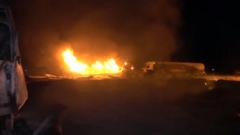Trump's assertion that Ukraine's president shares blame for the ongoing conflict draws condemnation as tensions persist between the U.S. and Ukraine.
Trump Issues Controversial Remarks Blaming Zelensky for War Escalation

Trump Issues Controversial Remarks Blaming Zelensky for War Escalation
Former President's comments come in the wake of a devastating Russian attack on Ukrainian civilians, inciting global outrage.
In a recent press conference, former U.S. President Donald Trump controversially suggested that Ukrainian President Volodymyr Zelensky bears part of the responsibility for the war with Russia. His comments followed a tragic incident in the city of Sumy, where a massive Russian strike resulted in the deaths of at least 35 civilians and left many others injured, marking the deadliest assault on Ukrainian civilians for the year.
Trump's remarks came as he stated that both Zelensky and Russian President Vladimir Putin should be held accountable for the ongoing conflict, which has claimed countless lives. He claimed, "You don’t start a war against someone 20 times your size and then hope that people give you some missiles," implying that Zelensky's actions triggered a broader conflict.
This incident followed Russia's recent assault on Sumy on Sunday, which also saw continued strikes on the city on the following day. NATO Secretary General Mark Rutte visited Ukraine in a show of support for the war-torn nation, condemning the attacks on civilians and reinforcing the narrative that Russia is the aggressor in this conflict.
While addressing the media, Trump labeled the attack a "terrible mistake," though he did not elaborate on the specifics of Russia's claim that it had targeted a military meeting, leading to high civilian casualties instead. Ukrainian sources have indicated that a medal ceremony for military veterans was happening at the time of the strike. In response to this tragic event, Zelensky acted swiftly by dismissing the regional chief of Sumy, reportedly for hosting the gathering.
Trump's blame game didn't stop at Zelensky; he also implicated President Biden in contributing to the war's ramifications. Despite diminished diplomatic ties between the U.S. and Russia, Trump’s administration had previously taken an approach that involved negotiating directly with Russia to establish a ceasefire, sidestepping Ukrainian leadership. The former president maintained that Biden and Zelensky could have effectively curtailed the conflict.
With ongoing tensions and a backdrop of complicated U.S.-Russia relations, Trump's latest commentaries have rekindled discussions within political circles regarding accountability and the conduct of leaders in times of war. In a bid for peace, Zelensky prior to the attack had urged Trump to witness firsthand the human toll of the conflict, but now faces a mounting challenge to reconcile his government’s stance amidst mixed messages from international leaders.
In the wake of the recent violence, the Ukrainian military reported striking a base tied to the Russian forces responsible for the missile attack on Sumy, underlining the ongoing battlefield exchanges. As Ukraine grapples with decade-long hostilities with Russia, Trump's declarations are likely to add to an already charged atmosphere of blame and responsibility amid a humanitarian crisis defined by immense loss and suffering.
Trump's remarks came as he stated that both Zelensky and Russian President Vladimir Putin should be held accountable for the ongoing conflict, which has claimed countless lives. He claimed, "You don’t start a war against someone 20 times your size and then hope that people give you some missiles," implying that Zelensky's actions triggered a broader conflict.
This incident followed Russia's recent assault on Sumy on Sunday, which also saw continued strikes on the city on the following day. NATO Secretary General Mark Rutte visited Ukraine in a show of support for the war-torn nation, condemning the attacks on civilians and reinforcing the narrative that Russia is the aggressor in this conflict.
While addressing the media, Trump labeled the attack a "terrible mistake," though he did not elaborate on the specifics of Russia's claim that it had targeted a military meeting, leading to high civilian casualties instead. Ukrainian sources have indicated that a medal ceremony for military veterans was happening at the time of the strike. In response to this tragic event, Zelensky acted swiftly by dismissing the regional chief of Sumy, reportedly for hosting the gathering.
Trump's blame game didn't stop at Zelensky; he also implicated President Biden in contributing to the war's ramifications. Despite diminished diplomatic ties between the U.S. and Russia, Trump’s administration had previously taken an approach that involved negotiating directly with Russia to establish a ceasefire, sidestepping Ukrainian leadership. The former president maintained that Biden and Zelensky could have effectively curtailed the conflict.
With ongoing tensions and a backdrop of complicated U.S.-Russia relations, Trump's latest commentaries have rekindled discussions within political circles regarding accountability and the conduct of leaders in times of war. In a bid for peace, Zelensky prior to the attack had urged Trump to witness firsthand the human toll of the conflict, but now faces a mounting challenge to reconcile his government’s stance amidst mixed messages from international leaders.
In the wake of the recent violence, the Ukrainian military reported striking a base tied to the Russian forces responsible for the missile attack on Sumy, underlining the ongoing battlefield exchanges. As Ukraine grapples with decade-long hostilities with Russia, Trump's declarations are likely to add to an already charged atmosphere of blame and responsibility amid a humanitarian crisis defined by immense loss and suffering.























